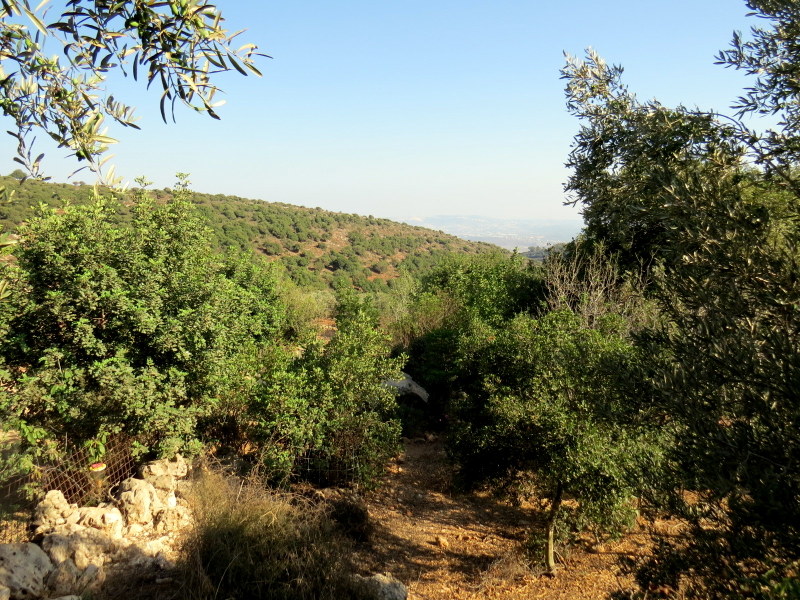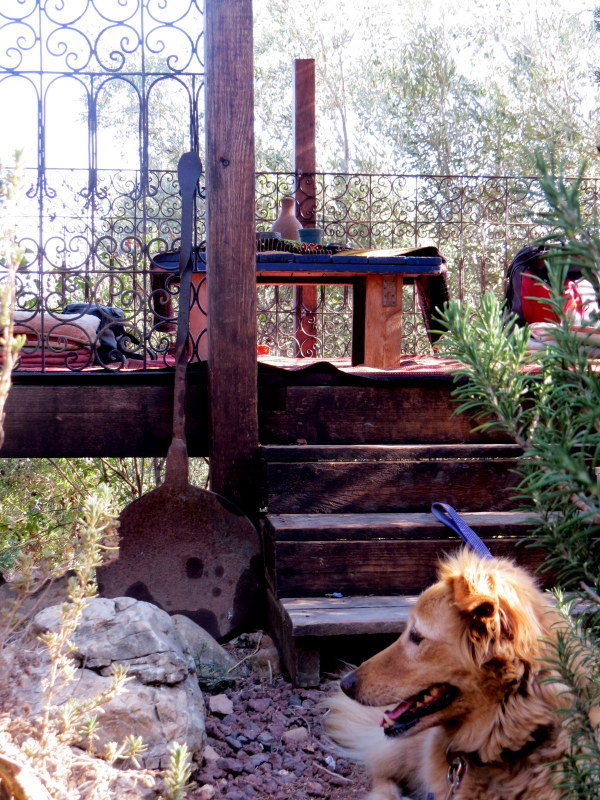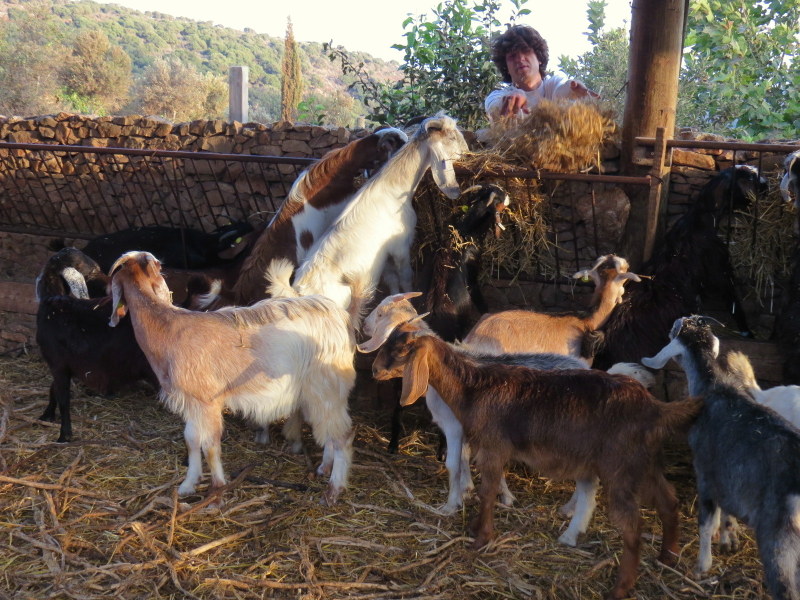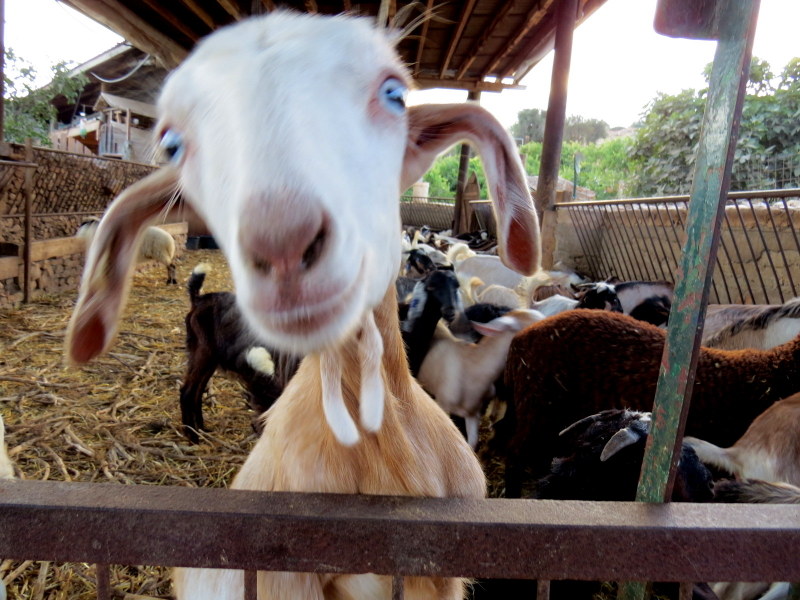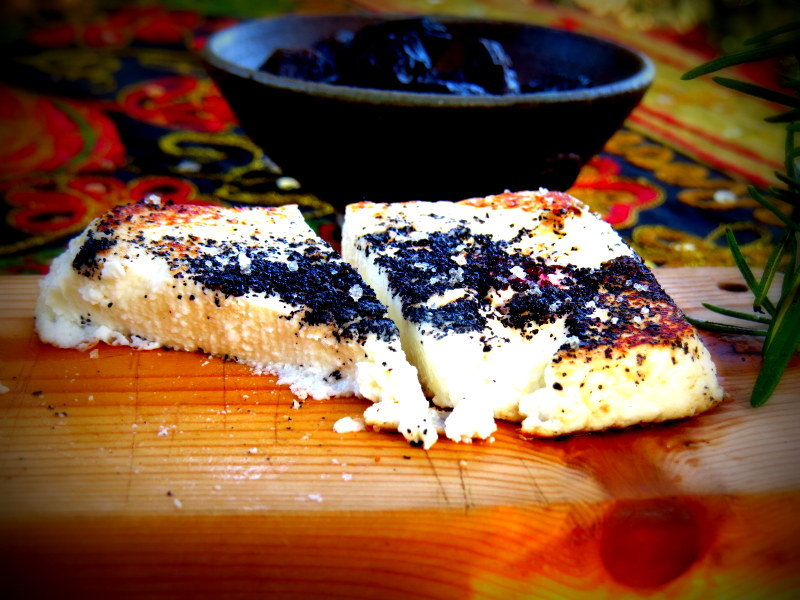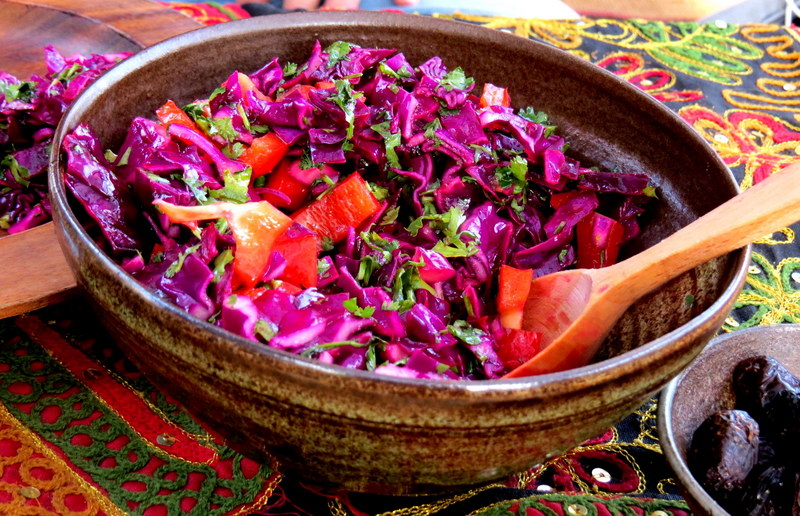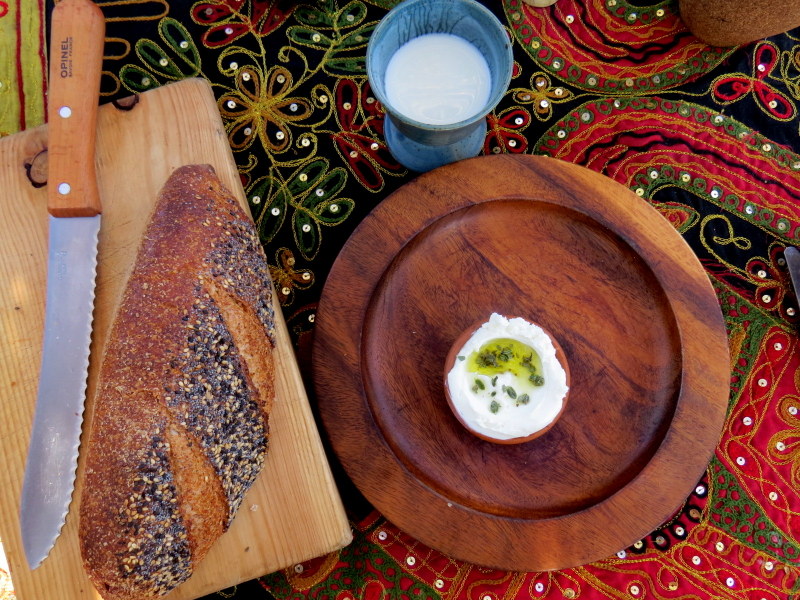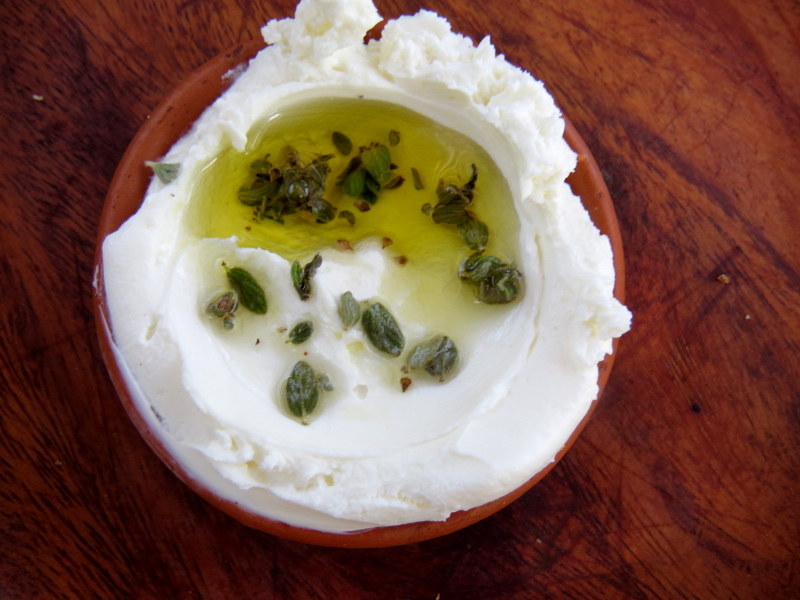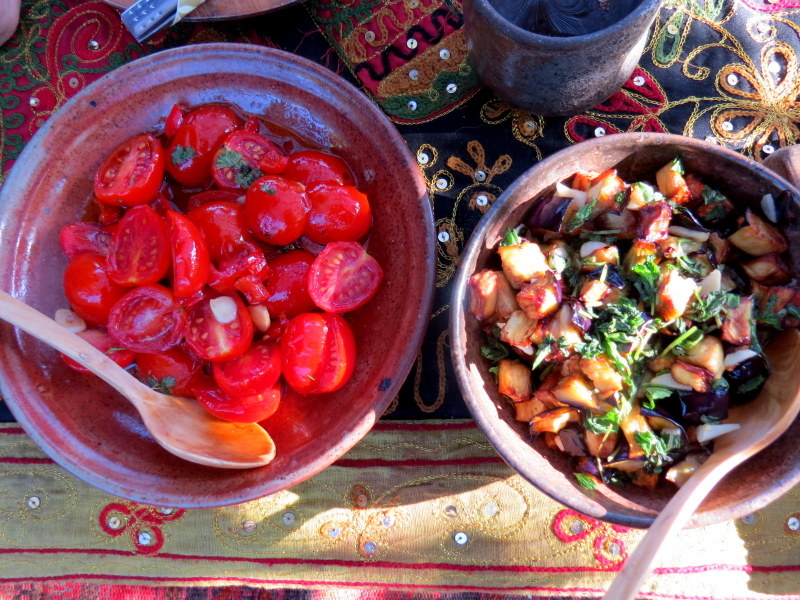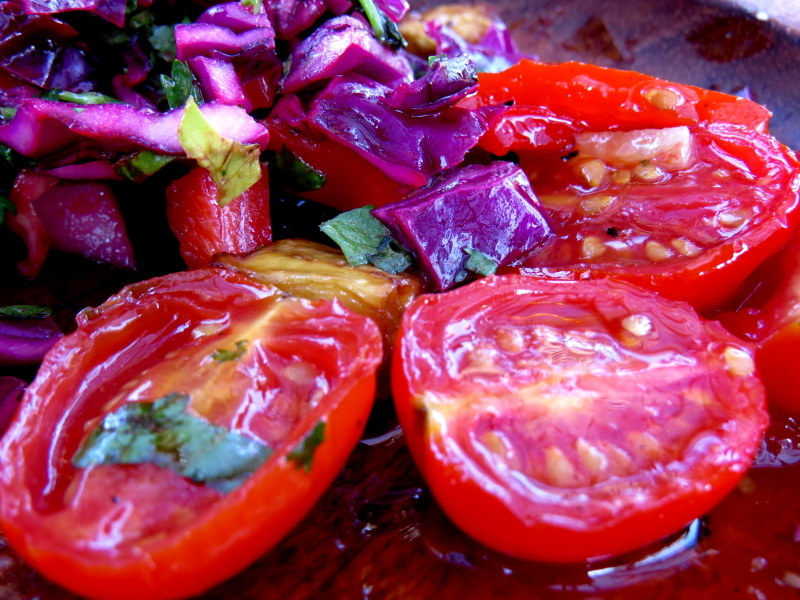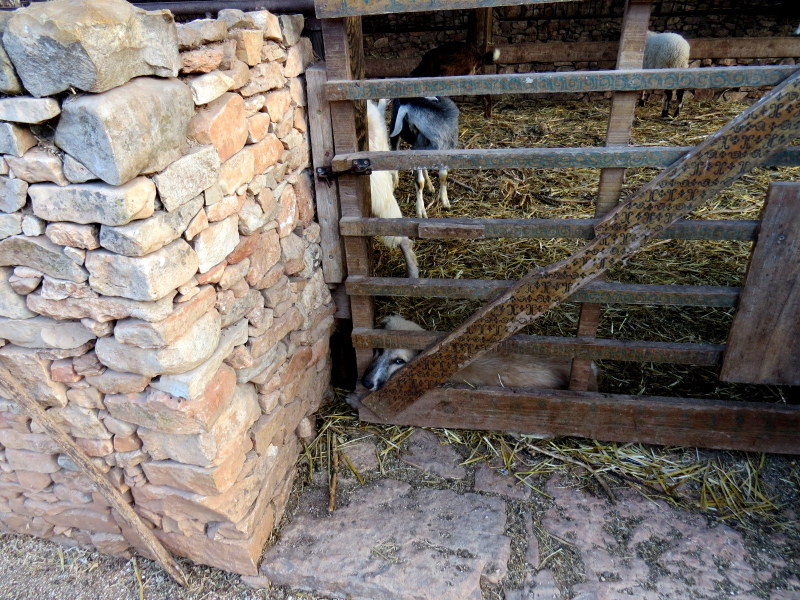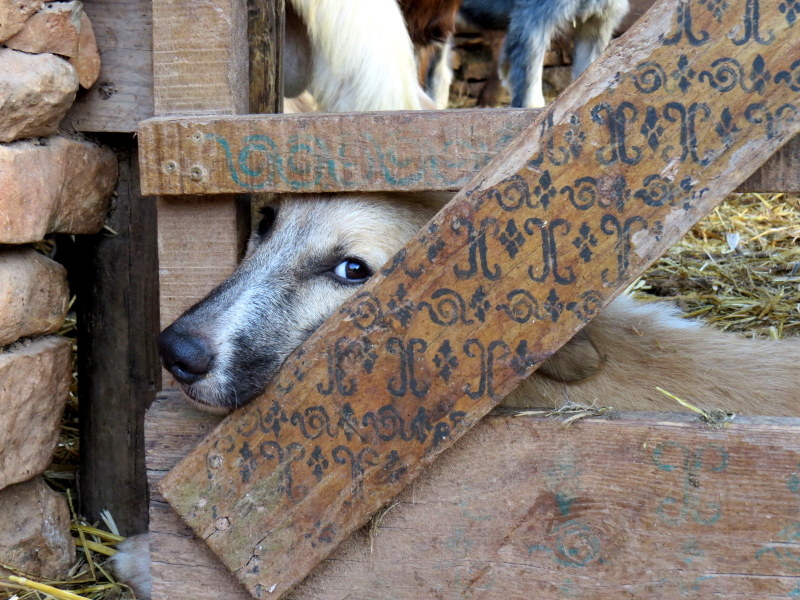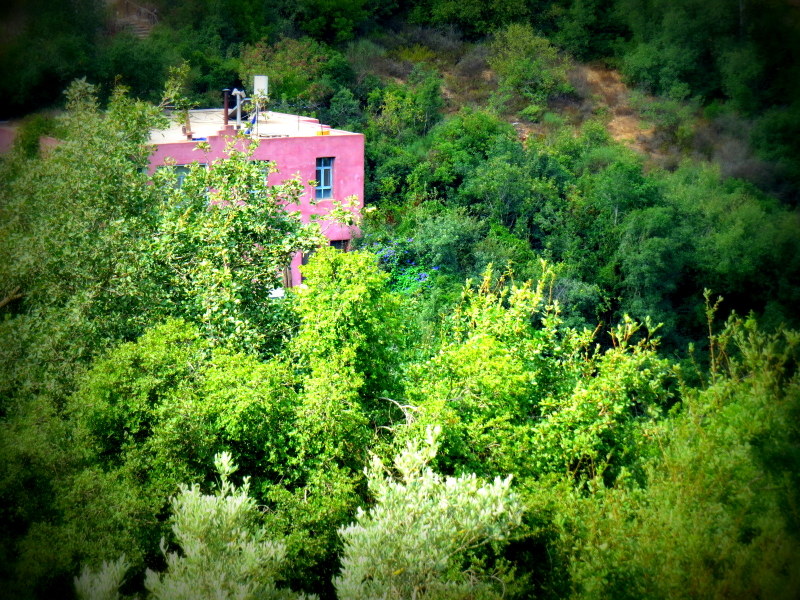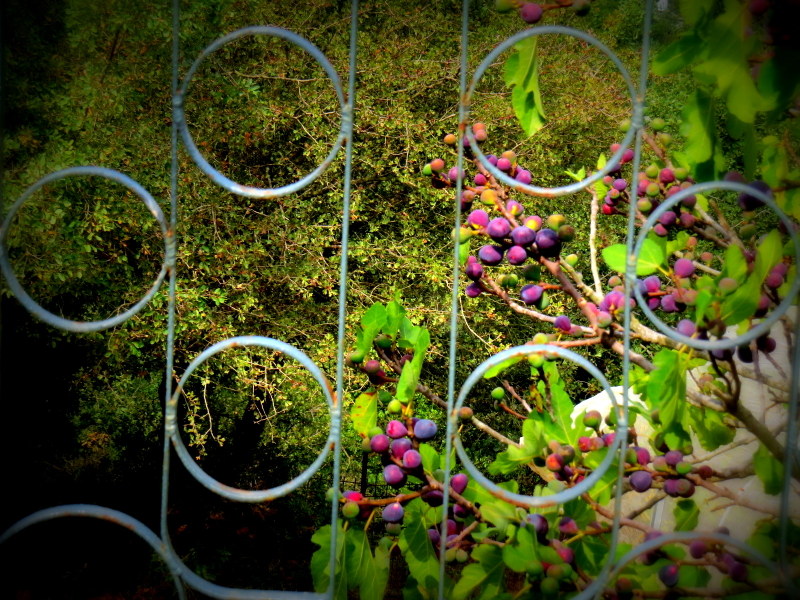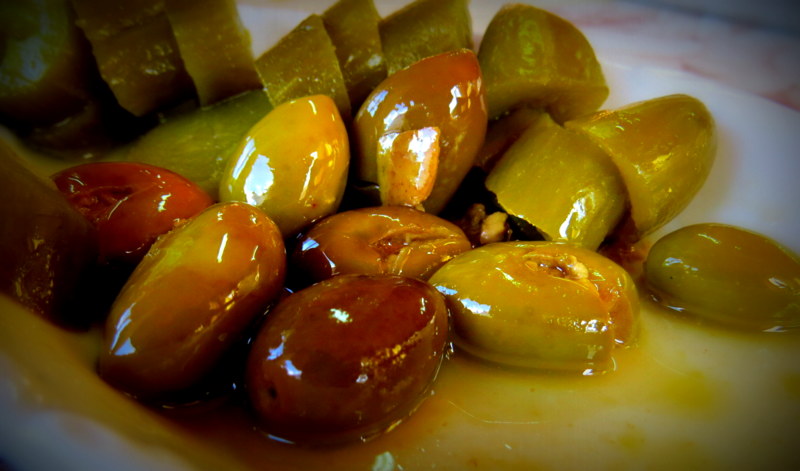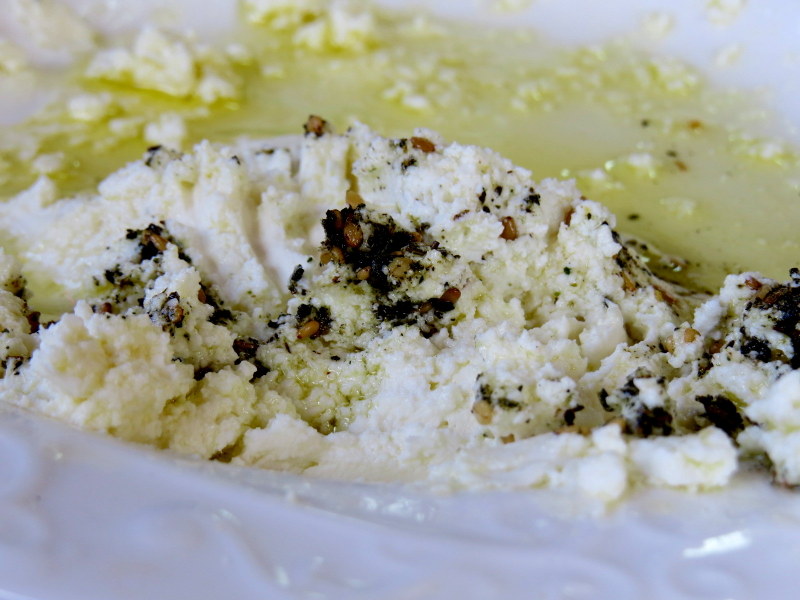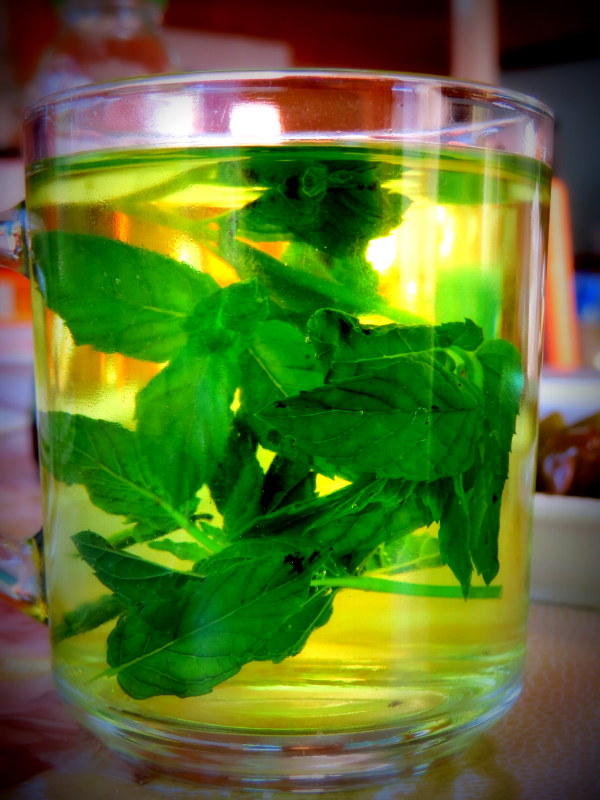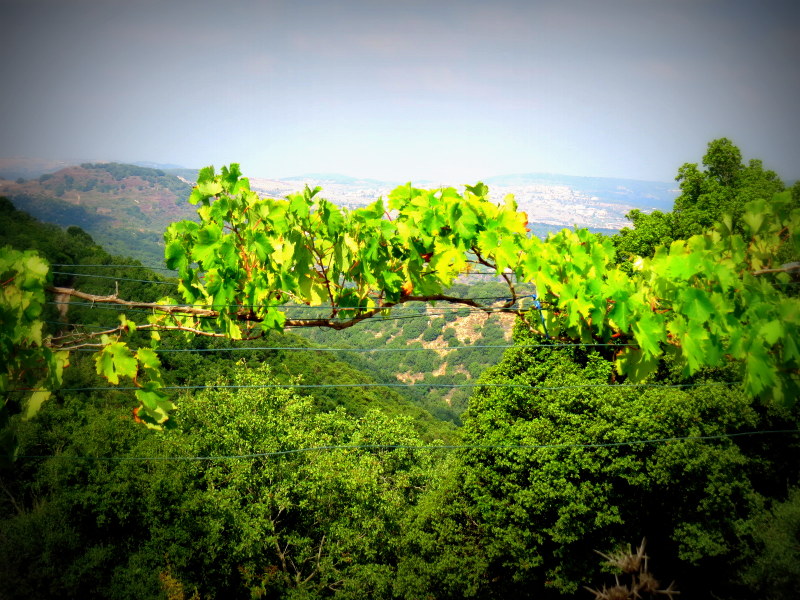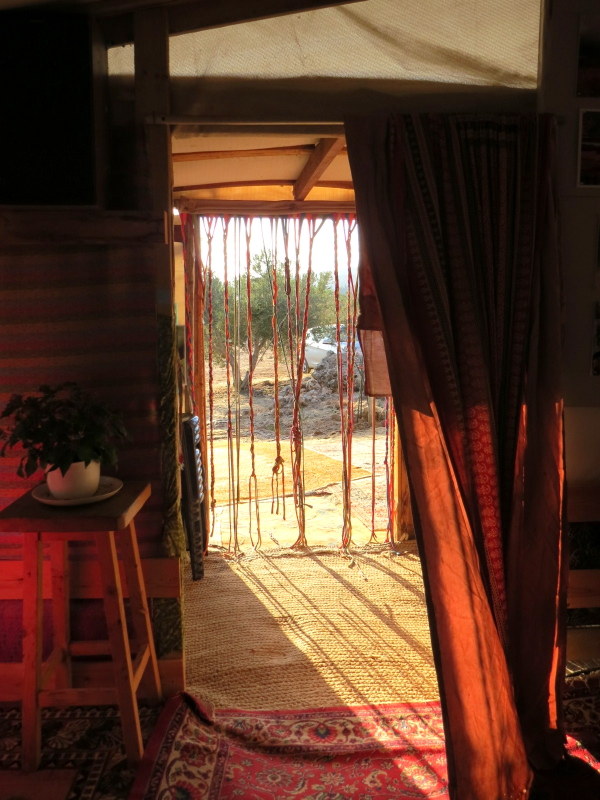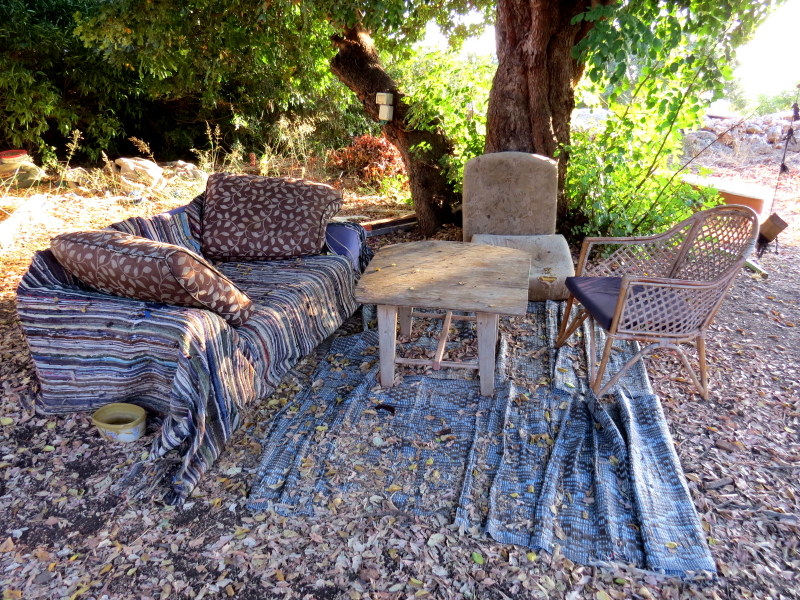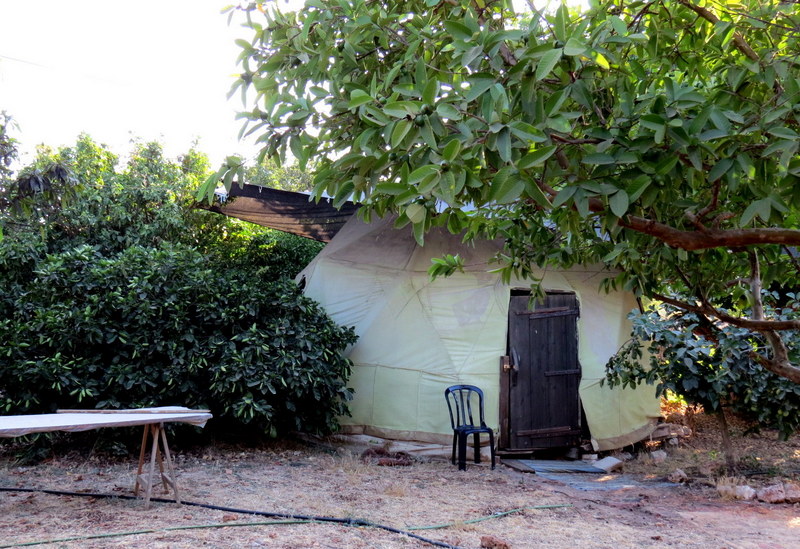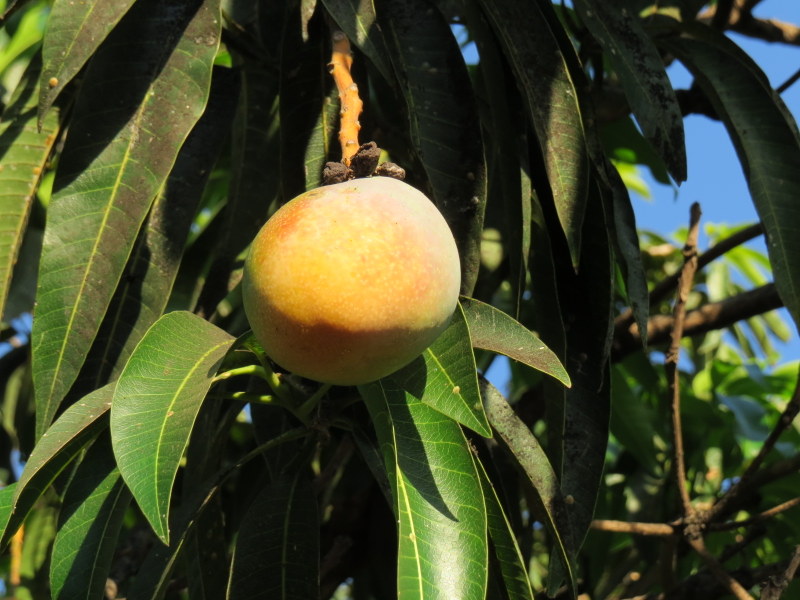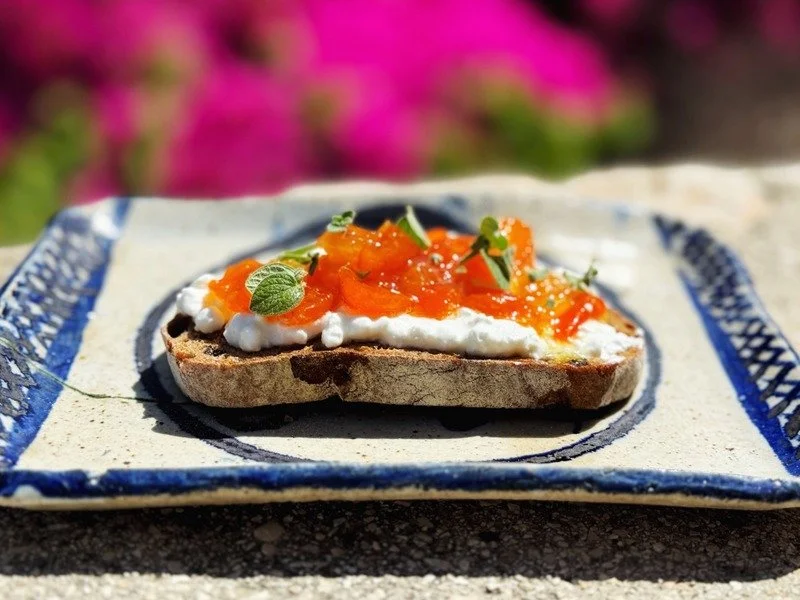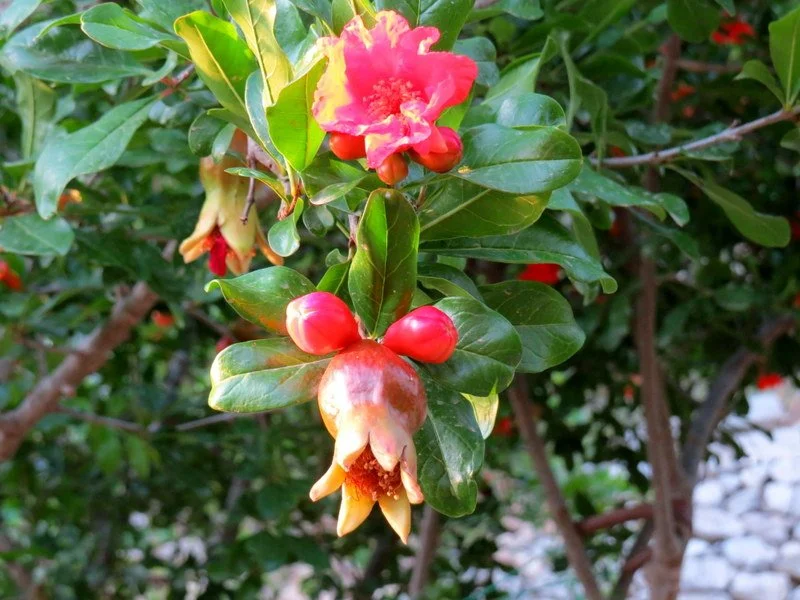I’ve been away this week, so no time for cooking. But don’t worry, there was plenty of the next most important activity – eating! It turns out that days off in the Galilee are very relaxing, leaving you lots of time to marvel at the quality of the local produce.
There are wonderful locally grown fruit, vegetables and fresh herbs; and simply outstanding goat cheeses, honey, and of course, olives and olive oil, much of it organic, from small farms and family kitchens.
Goats with the Wind
We started at Goats with the Wind, an organic solar powered goat and sheep dairy near Yodfat, in the southern Galilee. (It’s a play on words related to Scarlett and Rhett in the Hebrew too: Halav im Haruach)
Yodfat is a modern town built near ruins of the ancient town of Yodapata sacked by the Romans almost 2,000 years ago during the Great Jewish Revolt.
You feel you are going back in time, without visiting a single archaeological site, as you drive down a shockingly bad dirt road for what seems like miles, before being rewarded by the sight of the outdoor restaurant attached to Amnon and Dahlia’s dairy.
It’s basic, yet beautifully designed. Low stone buildings, open to the outside, for cooking and eating. The restaurant is in fact a series of private wooden platforms, like your own tree house, surrounded by carob and olive trees, over looking the Netofa Valley.
GOATS
We did see goats running free, but that was during the drive – and no hands could be spared for photos. I wish I had stopped though, since goats don't cooperate as much with the camera during feeding time!
Felt we needed a drink when we finally reached our little invitingly decorated tree house, and they do make their own wine, here where Jesus turned water into wine. (Well, when I say 'here' - the exact location of the village of Cana, where Jesus is believed to have performed the miracle, is disputed. There are several candidates, including one in Southern Lebanon, but none of them are very far away.)
In the end, we didn’t go near alcohol since I still had to drive back out! So we opted for their refreshing yoghurt drink, and a more sour than sweet lemon juice with mint to accompany the pre-set menu of salads and cheeses. We sat on the floor, near a low table, and felt very mellow. Who needs wine?
BLESSED ARE THE CHEESEMAKERS
The main game is the cheeses, made using traditional techniques from rocky Mediterranean islands Sardinia and Corsica, as well as mainland Italy and France.
To start we were served a thick sour labne, drizzled with olive oil and very flavourful oregano and sage leaves. Those few herbs had such a strong taste, they balanced the labne well. Then came a number of the house goat cheeses. One semi-hard cheese they call Isabella was served at 3 different stages – soft, medium and aged. Eaten with their home-baked bread, it was all delicious.
My favourite was the ricotta, which they make once a week. We arrived towards the end of its cycle, so it was served warm, in slices seared quickly on a grill. The result was sensational.
SALADS
The salads were simple and incredibly tasty. Each had a distinct flavour, Asian dressing on the red cabbage salad, young garlic slivers with the perfectly fried eggplant cubes, and the standout tomato salad where the tomatoes were slightly roasted – barely roasted? - which gave them an exquisite kick of flavour, intensifying their sweetness, while they still retained their shape and a little crunch.
Sage tea and chocolate brownies, hiding under a bell-shaped dish, were a lovely end to this meal.
DOGS
We brought our own dog, but you don’t need to - there were so many strutting about, in that busy, Can’t stop for a pat, Have goats to see to, working dog way.
One dog did make me laugh. He was lying as if trapped in the goat pen during feeding time, like a worker at an Apple factory in China – or an American Amazon employee? Psst. I'm not a goat. Get me outta here!
VOLUNTEERS
A lot of the farmwork, including hand milking the goats, and waiting on customers, is done by volunteers. Our waitress was a German girl on her gap year. She was in love with the Galilee and her work experience, which added another layer to the pleasure of the location and the food.
MATTAT
We could hardly bring ourselves to leave, but we still had to drive further north before sunset. Mattat is a tiny village on the border - any further north and you’d be in Lebanon – and many of the surrounding villages are Druze villages.
The Druze live mostly in this region ie Northern Israel, Lebanon and Syria, and follow a unique region which blends elements from Islam, Christianity and Judaism and adds reincarnation and trans-migration of souls. They only marry within the faith, and religion trumps nationality for them, so in return for freedom of worship, they offer loyalty to the ruler in the land. This means they are loyal to the Israeli government here, serving in the Israeli army, and to the Assad government in Syria, serving in the Syrian army.
We ate Druze dishes in the nearby village of Hurfeish. Their local olives, the green Syrian type, are bruised, then cured in brine and chilli. To die for! I ate every last one. Also delicious was their very sour and grainy labne, scooped up with the large thin lacy Druze pita. The food is simple, and familiar, but every flavour is intense – the zaatar on the labne was strong, and the local mint so sharp it made heavenly tea.
Our guest house, a stone cottage in the forest, was lovely, but the best thing about Mattat was the weather. The air was pleasant, almost cool, a relief from the heat which has been intense this summer. It was like visiting a Hill Station in India during the British Raj; a place to “rest and recuperate from the arduous life on the plains.”
In Jerusalem an Indian woman I know was complaining about the heat. When I asked her if it wasn’t hot in in India too, she said, “Yes, in India we sweat, but here we burn!”
There was no burning in Mattat, and the greatest sense of being on holiday came from that!
KLIL
Klil is an eco village in the Western Galilee. Like the goat dairy, it’s not connected to the power grid. It generates its electricity from solar and wind. They make olive oil from their olive trees, organic honey from their hives - more about that in next week’s post on honey cake for the Jewish New Year - and as well as olives, pomegranates, persimmon and figs, there was a surprise mango tree! The only restaurant open the evening we arrived was Café Klil, set in a tent. which continued the ‘inside/outside’ experience.
They also do lodgings - yurts and tents - and really good food. In a small isolated village you could make much less effort and the locals would still come, so I really respect them for that.
The Klil cafe prepared perfect Indian chai, buttery short-bread biscuits and lovely light Mahlabi – the Middle Eastern version of panna cotta, a milk pudding flavoured with rose water, or sometimes orange water Their mahlabi was softer than usual, as if it had no gelatin or conrstarch in it. It had a more custardy feel, and I suspect a big component was the excellent local yoghurt. The white concoction was drizzled with a jammy reduction of strawberries and plums, and in keeping with the Indian theme, flavoured with cardamom seeds. And rosewater of course. Lovely!
And all this even before I do the ‘Galileat’ market tour! These are culinary tours run by an old mate, Paul Nirens, originally from Melbourne, who takes you to all the best produce sources as well as to Arab and Druze kitchens for cooking classes. Can’t wait to go back!



